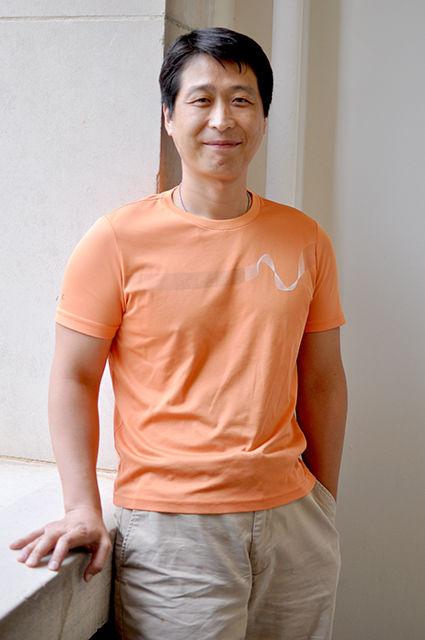South Korean Air Force officer and graduate student Gi Young Kim came to NC State two years ago to study operations research. But when he began to ride the Wolfline, he was disappointed to find tired students and an overall lackluster environment for both drivers and riders.
Kim wants to give the buses a makeover by playing music to bring students together and make the ride more fun.
Kim said the first year he came to NC State, he rode the Wolfline regularly but realized it was too quiet. People looked exhausted and everyone was looking at their phones and tablets with ear buds in. Nobody interacted with one another.
The Wolfline needs some change, Kim said.
“The Wolfline bus idea is so good,” Kim said. “I like how it offers rides to the public and everybody can use the Wolfline bus, and the Wolfline buses connects every campus around NC State University. So it’s a very good idea, but we do not use 100 percent of its potential.”
The first thing the Wolfline needs to do is add something “funny and exciting,” according to Kim. Kim said although he went to an Air Force Academy and nothing was funny there, he has talked to his friends about how fun their time was at college, and he wishes he could experience the same thing.
“When I first came here, I noticed everybody just focuses on studying or sports, but I think one of the purposes of the campus life of the young student is learning the joy of life,” Kim said. “University is not just to prepare for a job. I think students should learn some life lesson or some communication, social networking and the joy of life from their professors and from other students.”
Installing a sound system in the Wolfline buses is a good start to making campus more fun for everyone, according to Kim.
He said the NC State fight song should play on the buses because right now, only people who go to games know it, and the fight song unifies students and gets them excited.
“In the movie Monsters University, everybody sings the university song before the game,” Kim said. “It was so awesome. I was so excited with that idea, so I wish I had that kind of experience.”
In addition to the fight song, Kim proposed that each bus play a different genre of music or that they all play different music on different days. This music would promote communication among riders and drivers, according to Kim.
“If the driver turns on the radio or the music system, then everybody will take off their ear buds and listen to music together,” Kim said. “Then sometimes they will be humming and sometimes they will sing together, and that would be very exciting and good for socializing.”
Kim said he emailed his idea to David Rainer, the associate vice chancellor in public safety who is in charge of Wolfline bus ideas. Though Rainer liked the idea, he said music would be a distraction to the bus drivers and they would have to yell over the music to notify riders of the next stop.
“Our main objective for the Wolfline is to think safe, be safe, and we think that playing music would be distracting,” Rainer said.
Rainer also said the Wolfine is not a normal bus, meaning stops are very close together and bus drivers have to announce every stop to the students.
“Playing music just didn’t seem practical because it would constantly be interrupted,” Rainer said. “It’s not like we are driving from Chapel Hill to Raleigh. There is 30 seconds between each stop, which means the music would be interrupted every 30 seconds.”
Kim said he appreciated Rainer’s response, but he doesn’t think music would be a distraction to drivers. In Korea, most buses turn on the radio or have a big screen on the bus to play movies, which made transportation a better experience.
“Is there any study about this?” Kim said. “Is there any supporting theory that it is bad for safety if I listen to music while I drive in a car? I saw some drivers shouting the next stop announcement, and shouting next stop will cause voice problems in the future, so it’s better to use a player to show next stop than Wolfline driver announcement.”
Kim said the problem is most of the university administrators don’t want change. According to Kim, if we want to grow and better ourselves, we have to change.
“That’s the first step to improvement of our life,” Kim said. “If we do not change, we can survive, but we cannot thrive.”
Kim said the university should at least experiment with his idea by putting a sound system in one bus and observing the results.
But until then, Kim only rides the “gloomy” Wolfline if there is no other choice, often choosing to ride his scooter to campus instead.








